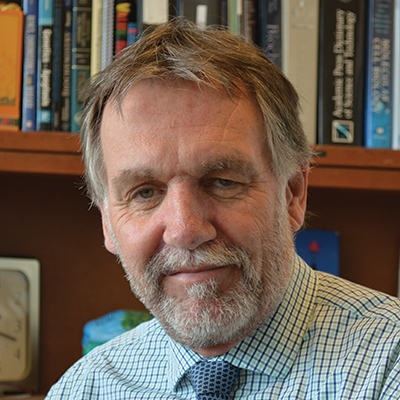Gordon Shore (1945—2018)
Gordon Shore, a professor at McGill University, passed away Sept. 7 after a long and courageous battle with pancreatic cancer. We remember him as a wonderful husband and father, a steadfast friend and supporter of the community of biomedical scientists in Canada and abroad.
 Gordon ShoreGordon Shore, a professor at McGill University, passed away Sept. 7 after a long and courageous battle with pancreatic cancer. We remember him as a wonderful husband and father, a steadfast friend and supporter of the community of biomedical scientists in Canada and abroad.
Gordon ShoreGordon Shore, a professor at McGill University, passed away Sept. 7 after a long and courageous battle with pancreatic cancer. We remember him as a wonderful husband and father, a steadfast friend and supporter of the community of biomedical scientists in Canada and abroad.
Mitochondria were the center of Gordon’s scientific life. The coincidence of the endosymbiotic origin of mitochondria and the origin of eukaryotes has captivated life scientists. Today, understanding mitochondrial function and dysfunction is key to understanding overall eukaryotic cell function and the cellular basis of human disease. Gordon’s contributions to our knowledge of mitochondria began with his early studies that revealed the significance of the links between mitochondria and the endoplasmic reticulum, or ER, in mammalian cells and culminated in elucidating the roles of mitochondria in cell survival and cell death and the relevance of these processes to disease, especially cancer.
Gordon’s early work in mitochondria was done as a postdoctoral fellow with Jamshed Tata at the National Institute of Medical Research in Mill Hill, United Kingdom, now part of the Francis Crick Institute in London. In 1977, Shore and Tata uncovered . Today we understand in great depth the molecular details validating this hypothesis, extending to the acquisition of lipids for mitochondrial biogenesis, to calcium flux, to the mechanisms underpinning mitochondrial division and cell death.
After he was recruited to Montreal in 1977, Gordon carved out his niche in the mitochondrial world. In a field of giants like GĂ¼nter Blobel, Gottfried Schatz and Walter Neupert, Gordon made seminal of the and in mammalian cells.
In the early 1990s, Gordon began a long friendship with the late Stanley Korsemeyer to focus on play in this process. With the virologist Philip Branton, Gordon used the well-defined adenovirus infection model of apoptosis to unravel the . The intricate dance of the ER and mitochondria to coordinate cell death and cell death suppression was defined through Gordon’s work on . Gordon together with his former graduate student , now a professor at McGill, described the contribution of dynamin-related protein 1 in the remodeling of mitochondrial cristae upon activation of BIK and showed this process is .
Gordon was an inspiring leader in on the ER-mitochondrial axis and autophagy to the clinic. In 1988, he cofounded with Philip Branton a biotech company, GeminX, that developed a first-in-class Bcl-2 inhibitor that targets this process. Gordon expanded his role in drug development as the chief scientific officer at Therillia, a Montreal pharmaceutical company that identifies candidate drugs for the treatment of cancer. Truly, Gordon had a profound impact on our understanding of the basic biology and clinical implications of mitochondria. He has left an indelible mark on his chosen field of research.
Gordon’s scientific contributions are valuable and long lasting, but when those of us who knew him think of him, we will most remember his qualities as a friend and colleague. He was a kind, supportive, optimistic friend who made our lives the better for knowing him. He will be sadly missed.
We thank Kate Beckingham of Rice University, Houston; Phil Branton, Heidi McBride and Dave Thomas of McGill University, Montreal; Jam Tata of the NIMR, London; and Walter Neupert, University of Munich, Martinsreid, for comments and remembrances.
Enjoy reading ASBMB Today?
Become a member to receive the print edition four times a year and the digital edition monthly.
Learn moreGet the latest from ASBMB Today
Enter your email address, and we’ll send you a weekly email with recent articles, interviews and more.
Latest in People
People highlights or most popular articles

Understanding the roles of extracellular matrix and vesicles in valvular disease
MOSAIC scholar Cassandra Clift uses mass spectrometry and multiomics to study cardiovascular calcification and collagen dysregulation, bridging her background in bioengineering and biology to investigate extracellular vesicles and heart disease.

Learning, leading and lifting others
Tigist Tamir’s journey from aspiring astronaut in Ethiopia to cancer researcher at the University of North Carolina highlights the power of mentorship, persistence and curiosity in shaping a scientific career focused on discovery and equity.

Biochemists and molecular biologists sweep major 2025 honors
Recent Nobel, MacArthur and Kimberly Prize honorees highlight the power of biochemistry and molecular biology to drive discovery, including immune tolerance, vaccine design and metabolic disease, and to advance medicine and improve human health.

Subramanian receives electron microscopy honor
He delivered remarks at the International Conference on Electron Microscopy in Bangalore, India.

Bioart for fall: From order to disorder
The cover of the fall issue of ASBMB Today was created by ASBMB member, Soutick Saha, a bioinformatics developer at Wolfram Alpha LLC.

Doudna wins Priestley Medal
She will receive a $20,000 research grant and will formally accept the honor at the ACS Spring 2026 conference.


